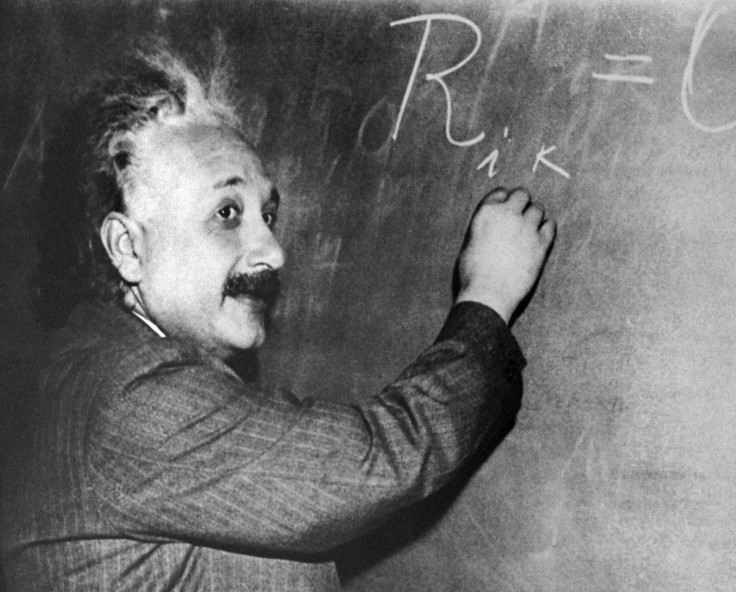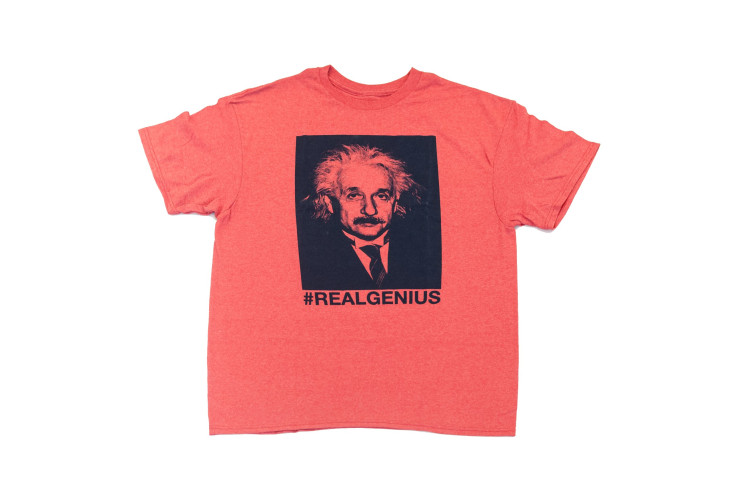Albert Einstein Has Millions Of Followers On Facebook And Twitter; Meet The Social Media Marketers Hoping To Boost His Brand

Albert Einstein died 60 years ago but still tweets every day. With the nearly 17 million Facebook fans he has amassed posthumously, his social media following is formidable even by living-person standards, surpassing "Jersey Shore" reality star Snooki, Patriots quarterback Tom Brady and U.S. Vice President Joe Biden — combined.
The famous scientist and quintessential genius published bold theories on relativity that shaped modern-day physics. But he has also become a modern brand, complete with a New York-based marketing team charged with preserving and promoting his reputation in the Internet age. That group, at Corbis Entertainment, hopes Einstein’s stellar social media performance will keep the public in touch with his scientific achievements and boost sales of products that feature his likeness.
Anthony Iliakostas, who runs Einstein’s social media for Corbis, says the responsibility requires him to think daily about what Einstein stands for and what he is not.
“He evoked wisdom, intellect, genius, creativity,” he says. “He's an icon and he goes beyond the science world.”

The monetary value of that genius adds up in today's dollars. At their NYC headquarters, the Corbis team has stacks of merchandise from companies that have paid to use Einstein’s image or quotes for their products—from board games, to educational kits to bobbleheads. Corbis wouldn’t say how much Einstein makes on these deals, but directed IBT to a Forbes article that states he is the fifth-highest-earning dead celebrity, raking in $20 million a year on average.
When Einstein died in 1955, he bequeathed his estate and the commercial rights to his image to The Hebrew University of Jerusalem. Einstein helped found the university and was a fervent supporter in his final years. The university hired the rights representation group at Corbis to manage the famous scientist's brand and image. Now, Corbis earns a percentage of the deals it secures.
A few years ago, Kevin Connelly, director of that group, pitched the idea of launching social media accounts for Einstein to the university. He wanted the accounts to serve as a funnel for questions from fans, which had previously been sent to the same email as licensing deals. His group receives at least one business inquiry and five to 10 requests for an autograph, teaching material or general information from fans every day.

Roni Grosz, curator of the Albert Einstein Archives at Hebrew University, was skeptical at first. He didn’t think it was “fitting,” as he puts it, for Einstein to be on social media. But he agreed to let Corbis try it.
Now, Grosz is fond of the following that Einstein has amassed. He’s pleased at reaching the 18-to-35-year-old crowd, who make up the vast majority of Einstein’s fans, and to see how popular the Nobel Prize-winning scientist is in India and Brazil, which have both contributed more followers than the U.S.
Plus, the strategy has the potential to bring in new revenue if Einstein’s image becomes more popular through social media and leads to additional licensing deals. Revenue from Einstein’s brand is particularly useful to the university because, unlike donations, there are no strings attached.
“Einstein’s really our guy,” Grosz says. “That in the end generates income and international standing and ranking and so on.”
Meet Albert Einstein
So what’s it like to run the social media account of the world’s most famous scientist? There are a few hard and fast rules. Iliakostas is careful not to tweet as if he is actually Albert Einstein, preferring an objective voice. He does not respond to current events, promote emerging research or pontificate on developing news. He tries to keep it neutral and educational, while still lively and engaging.
As a result, Einstein’s content ranges from the serious to the silly. No one on the Corbis team has any scientific expertise, so they rely on outside sources and experts as well as historical records to populate the accounts. In August, Iliakostas cross-posted articles from a recent Scientific American issue dedicated to Einstein’s theory of general relativity. On National Puppy Day in March, he uploaded an image to Facebook of Einstein with his dog.
“It’s not rocket science," Connelly says. "It's just a lot of common sense and it's fun."
Albert Einstein surely enjoyed soaking some sun rays when he visited the beach. http://t.co/zWDYDKNvwf pic.twitter.com/PLV3E2vRVX
— Albert Einstein (@AlbertEinstein) October 16, 2015Loyal followers will note that Einstein’s Twitter and Facebook pages are on something of a schedule. Every Thursday, Einstein participates in #tbt with one of hundreds of photos of the scientist that Corbis sells through the group’s image library. On Mondays, Iliakostas posts memes with verified Einstein quotes and proper attribution. These memes garner anywhere from 30,000 to a quarter million likes on Facebook.
Sometimes, Iliakostas uses Einstein's account to correct people who erroneously attribute quotes to Einstein. It happened recently with a Kardashian sister (though he can’t recall which one), and once with T-Pain. A gamer named @FaZe_Rain once gave Einstein’s Twitter page its single biggest daily jump in followers when he tweeted about it.
But Grosz still worries that social media is reducing Einstein’s image to that of a simplistic and celebrated scientist. He cares more about preserving Einstein’s full identity than picking and choosing the parts that look best on Instagram.
“In the last 30 years of his life, he was not very successful in the sciences,” he says. “He became an old, lonely man. He was a bad husband, he was a bad father. But he was only human.”
Look out for a tee w/ this Einstein design coming soon to commemorate 100 years of relativity. #ThanksEinstein pic.twitter.com/xOVKBvKojJ
— Albert Einstein (@AlbertEinstein) October 19, 2015Einstein vs. Edison
Einstein’s remarkable social media success is inspiring. But most scientists seeking to commercialize their brilliance or posthumously preserve their image would struggle to achieve anything close to his popularity.
“This works with Einstein because I'd say he's one of the few scientists that most Americans really recognize,” Dominique Brossard, a marketing expert who specializes in life sciences at the University of Wisconsin-Madison, says. “I think for brand equity, he would be hard to beat.”
Take Thomas Edison, for example. He invented the light bulb, the telegraph and movies and held over 1,000 patents. To John Keegan, president and chairman of the Edison Innovation Foundation and Charles Edison Fund, Edison embodies innovation and entrepreneurship better than any other scientist, alive or dead.
“An inventor creates a single product or process and an innovator changes the world,” he says. “It wasn't good enough for Edison to invent the incandescent light bulb. In order to do that, he had to create the whole power industry with switches and generators and power lines.”
Edison’s contributions were widely celebrated by the public, which directly benefited from them while he was still alive. Time magazine may have named Einstein the “Person of the Century” but Life magazine dubbed Edison the “Man of the Millennium.”
“When he died in 1931, he was the most popular person in the world and everybody dimmed their lights for a minute,” Keegan says. But today, Edison’s social media presence is flailing. He has a measly 113,000 Facebook fans.

His inventions and brand certainly have lasting financial value, if not heavy social media appeal. Each of Edison’s famous umbrella signatures is worth at least $1,500. Keegan estimates a letter to his son Charles that he keeps in his office is probably worth $50,000. The Thomas Edison National Historical Park in New Jersey, where the inventor’s home and laboratory remain, is valued at $4 billion. And while Corbis receives many more requests to use Einstein on products and merchandise, it's Edison who wins when it comes to advertising deals.
In fact, Keegan boils Edison’s principles down to four basic concepts and pitches them as highly relevant to companies and industries that value innovation: 1. Think outside the box, 2. Be entrepreneurial and open to risk, 3. Fail your way to success and 4. Success demands continual improvement.
“We’ve had more success in doing advertisements with Edison because companies are very attracted to what he says about innovation,” Connelly says. (Corbis manages commercial rights for Edison but does not run his social media accounts.)
Edison has been featured prominently in ads by Cree Lighting, Mazda, several banks and the Japanese patent office in recent years. He has appeared on the Super Bowl twice. Keegan wouldn’t reveal the size of these licensing deals but says, “It can be very substantial. Six figures is not unusual.”

Even Edison’s meager social media presence has helped the group to land more deals. “We find that when we get a call from someone interested in licensing from us, a corporation with a new electric vehicle, they have already been on our social media,” Tom Ungerland, a trustee of the Edison Innovation Fund and Charles Edison Fund, says. “To some extent, it drives our licensing.”
Similarly, Connelly says Corbis is exploring ways to directly monetize Einstein’s social media following. Of course, those plans hinge on the assumption that Einstein’s popularity on social media will continue to grow, even as his death drifts further into the past.
Iliakostas, at least, has no doubts. “There's always going to be a connection between Einstein and today’s scientific theories,” he says confidently.
Brossard agrees. “I think that's a brand that I can see lasting because after all, there’s only one Albert Einstein,” she says. “From a marketing perspective, there's no competition.”
© Copyright IBTimes 2024. All rights reserved.





















